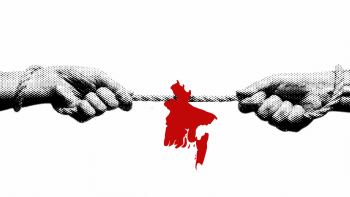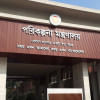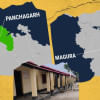Column by Mahfuz Anam: Who runs the country?

There is no question as to who runs the country. It is Sheikh Hasina, our prime minister. But who does she run it through? Is it through the parliament and the political forces? Or is it through the bureaucrats? That is the question we try to answer in this column.
For a functional democracy, we need both elected political masters and non-elected public servants. The first changes on the basis of public support, while the second is permanent. The former makes policies, while the latter implements them. The former's proclivity is to be populist, while it is the duty of the latter to ensure accountability. The political leadership is funded by public support, while the other is paid for by the taxpayers' money – perhaps leading to the term "public servant."
This combination of a changing political leadership and a "non-changing" governmental structure is the key to successful governance. Thus, there exists a supreme need to have a fine balance between the two.
Unfortunately, we have totally distorted that balance. And it has happened from both ends. Politicians politicised the bureaucrats, and then bureaucrats bureaucratised politics. Both try to extract maximum benefits from the other with the ordinary people being totally ignored, as there is none to fight for their concerns.
At the moment, the bureaucrats seem to be in the driving seat. The consequent marginalisation of our politicians is not only pathetic but also dangerous because, however distorted and skewed, the politicians have some sort of accountability to the people in the form of party, local, and national elections. Our bureaucrats' accountability is only to their seniors, which, over time, has become fundamentally self-serving.
Today, more and more decision-making rests in the hands of powerful bureaucrats who have greater access to the centre of power in the person of the PM who, over the last several years, has come to rely more on the bureaucrats then on her political colleagues.
Where the politicians have lost out wholesale to the bureaucrats is in the gradual diminution of the power, effectiveness, relevance, and prestige of the parliament. When parliament is reduced to practically nothing except self-praise and opposition-bashing – even when it is virtually non-existent – politicians as a group, regardless of whether they belong to the treasury or the opposition bench, lose. Now, the role of our MPs in overall policy formulation or in the general oversight process is next to nothing. We do not pay any attention when they speak because their comments hardly carry any weight.
I would love to be proved wrong when I say that no issue of any significance ever gets debated in our parliament. The climate crisis has not been a subject of any serious discussion, even though we have been identified as one of the most, if not the most, vulnerable country in the world. Starting from the pandemic to the global economic crisis, to money laundering, to loan defaults, to quality health services and education, and specific topics like why Bangladesh has among the highest numbers of road crashes in the world – none of these subjects of public interest appears to attract the attention of our MPs.
Ironically, the bureaucracy's involvement in politics was legalised during BAKSAL, when the stature of our politicians was highest in our history. Later, the military's illegitimate entry into government and their natural dependence on the bureaucracy greatly enhanced the latter's power in the political sphere.
We received a golden opportunity for a fresh start to build democratic institutions with the toppling of the quasi-military autocratic government of General Ershad through a peaceful mass agitation. The grand coalition of political forces constituted a total victory, which set forth the future direction of politics in the country. (See this writer's column titled "Dreams Reborn," from January 14, 1991). However, the extreme rivalry between the BNP and AL gradually weakened this grand alliance and split the political forces, creating an opening for bureaucrats to regain power and political influence.

Perhaps the fatal shot in the process came when "Janatar Mancha" was set up by City AL chief and the first elected mayor of Dhaka, Md Hanif, outside the secretariat. A large number of bureaucrats joined it to protest against Khaleda Zia's government. For the first time – overtly of course, for they were always a covert force – bureaucrats became a factor in determining which party was to come to power. And they never looked back.
At the moment, the power of bureaucracy is symbolised by the rise of the Prime Minister's Office – the all-powerful PMO, which is manned by senior bureaucrats only. The principal secretary, the secretary of the PMO, and the cabinet secretary constitute the triumvirate that serves our all-powerful prime minister. If we add to them the finance secretary, the governor of Bangladesh Bank (also a bureaucrat), and maybe one or two other secretaries, then we have almost the total picture of the power structure that runs the country. The cabinet – the most crucial decision-making body in most governments – is essentially a rubber stamp, as is the Executive Committee of the National Economic Council (ECNEC), where suggestions mostly made by bureaucrats are signed off.
The rise of the bureaucracy's power cannot be fully understood without considering the gradual lowering of the quality of our politicians, and especially of their ethical norms and standards. Politicians were never judged by their "degrees," but by the degree to which they associated themselves with the hopes and aspirations of the people, and their commitment to serve them. When all that became substituted by one's wealth, ability to fund local mastans, indulge in violence (particularly in cornering their rivals), and buying their way through party nominations and the election process, their overall stature diminished.
Today, government officials assume that the development funds that an MP, a union parishad chairman or other elected public representatives get will not fully be used for the purpose it is allocated for. This automatically leads to tighter bureaucratic control and a tilting of power towards the officials. The recent distribution of pandemic-related assistance, allotment of Ashrayan houses, relief goods, and other government handouts through local administration (sidestepping local elected entities) bore testimony to the general mistrust of local political bodies.
"Bureaucracy" usually refers to administrative cadres, but taken in its larger incarnation – including all other cadres in education, health, etc, and especially the police and all the intelligence branches – we really get the full picture of the massive administrative body, which wields enormous power that has reached unfathomable proportions due to the gradual diminution of all accountability structures. This, coupled with the huge amount of resources allocated in our annual budget and mega-projects that are completely under bureaucratic control, the power of our bureaucrats has reached unimaginable levels, making for a lethal combination of political influence and control over allocation of funds.
Seldom, if ever, did our bureaucrats enjoy so much authority, such unbridled power and discretion. Not to mention the perks. It is as if the government is on its toes to take every step that will win them over to its side.
Why? Because so much of our politics now depends on the bureaucrats – especially the elections. It is the latter that gives our larger bureaucracy the final edge. Unless we restore elections to their free and fair status, the bureaucracy's power will continue to rise. And the stature, prestige, and power of our politicians will continue to decline, making for an ominous future for our democracy.
Mahfuz Anam is the editor and publisher of The Daily Star.

 For all latest news, follow The Daily Star's Google News channel.
For all latest news, follow The Daily Star's Google News channel. 












Comments